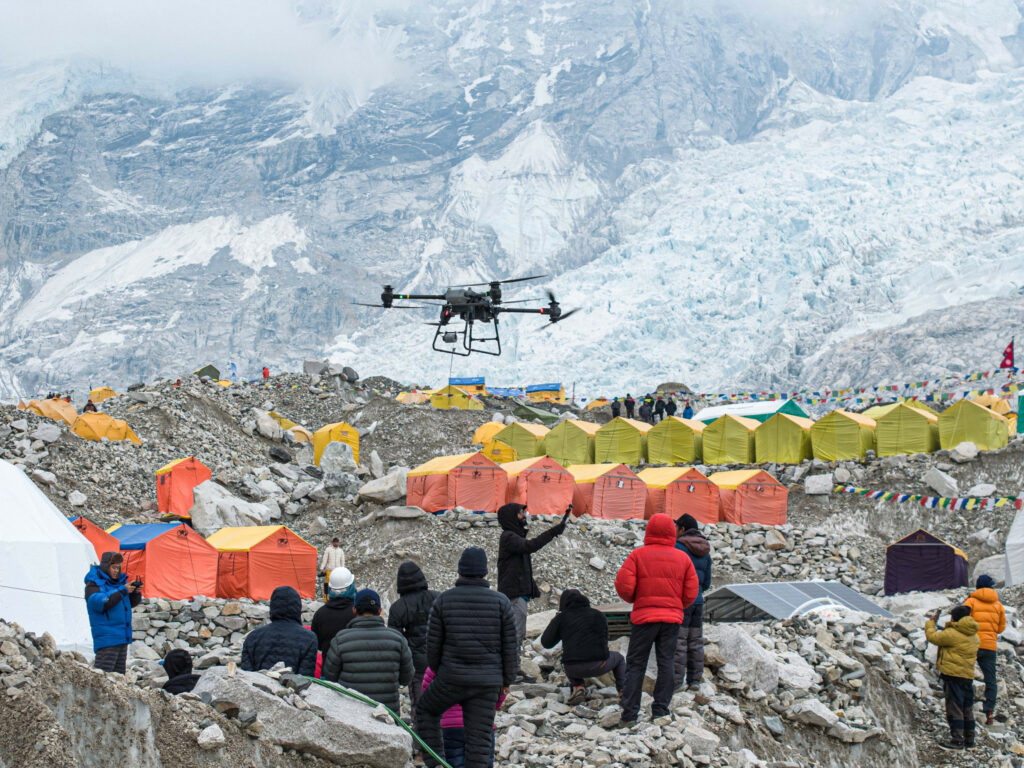A major provider of civilian drones has successfully tested a delivery service on Mount Everest, creating a flow of supplies and trash collection for mountaineers taking on the world’s tallest peak.
DJI, a Chinese company that makes some of the most popular drones in the U.S., partnered with Nepalese drone service company Airlift, video production company 8KRAW, and Nepalese certified mountain guide Mingma Gyalje Sherpa, to undertake the world’s first delivery drone trials on Everest earlier this spring.
“The ability to safely transport equipment, supplies, and waste by drone has the potential to revolutionize Everest mountaineering logistics, facilitate trash cleanup efforts, and improve safety for all involved,” Christina Zhang, senior corporate strategy director at DJI, told Newsweek.
The DJI FlyCart 30 in action on Mount Everest. Amid crushing crowds to summit the peak, drones could offer help in bringing supplies to climbers.
DJI
The first successful test was completed in April, with a DJI drone named FlyCart 30 carrying a payload that included oxygen canisters and other supplies from Everest’s main base camp to Camp 1, a distance of roughly 2,500 feet.
The DJI FlyCart 30 can carry a payload weighing up to 33 lbs. in extreme altitudes.
DJI
The camps, about 17,500 and 20,000 feet above sea level, respectively, are separated by the Khumbu Icefall, one of the most perilous stages of the ascent to the summit. While helicopters could theoretically make the same journey, they are rarely used due to the significant dangers and costs involved.
The DJI engineers had to account for temperatures ranging between 5 to 41 degrees Fahrenheit as well as wind speeds of up to 134 miles per hour.
The FlyCart 30, which launched globally in January, had to undertake rigorous testing including unloaded hover, wind resistance, low-temperature and weight capacity tests, Zhang said.
The DJI drone, which retails for about $20,000, has been deployed in other civilian missions, installing solar panels in Mexico and helping to plant saplings in steep hillside environments in Japan. Scientists in Antarctica and mountain rescue teams in Norway have deployed the FlyCart 30 as well.
“From the end of April, our team embarked on a groundbreaking endeavor to help make cleanup efforts on Everest safer and more efficient,” Zhang said. “We are thrilled to share that our DJI FlyCart 30 was up to the task.”
Without aerial help, local Sherpa guides typically transport supplies and clear what trash they can, tasks that have become more difficult as the mountain has faced issues of overcrowding in recent years. It can sometimes take the guides over 30 trips a season to transport oxygen bottles, gas canisters, tents, food and ropes across the icefall.
The drone service could relieve Everest guides from transporting supplies and trash.
DJI
On top of the hazardous conditions, the guides often trek through the Khumbu Icefall at night, when temperatures are at its lowest, because it’s when the ice is most stable.
“We need to spend six to eight hours each day walking through this icefall,” said Mingma Gyalje Sherpa, a mountain guide with Imagine Nepal. “Last year I lost three Sherpas. If we’re not lucky, if our time is not right, we lose our life there.”
A drone, however, can carry supplies on a round trip between camps in just 12 minutes, day or night, and without the danger to human life.
Everest climbers, who usually spend weeks on the mountain adjusting to the different altitudes, isareestimated to leave about 18 pounds of trash each behind on each climb — from oxygen canisters to food packaging to clothing to human waste, most of which remains there given the difficulties of garbage removal at tens of thousands of feet above sea level.
In its inaugural journey, the Fly Cart 30 picked up some of that trash and flew it to base camp on its return trip, illustrating a specific use case for DJI’s drone delivery system that could help bring the mountain back closer to its natural form.
Uncommon Knowledge
Newsweek is committed to challenging conventional wisdom and finding connections in the search for common ground.
Newsweek is committed to challenging conventional wisdom and finding connections in the search for common ground.
>>> Read full article>>>
Copyright for syndicated content belongs to the linked Source : Newsweek – https://www.newsweek.com/drone-mount-everest-sustainability-trash-supplies-airlift-1908184
